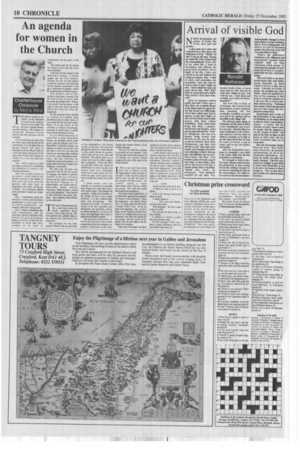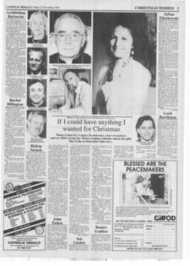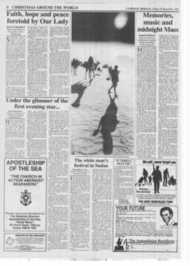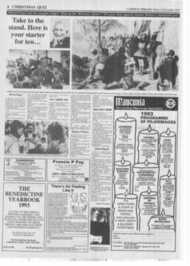Page 10, 25th December 1992
Page 10

Report an error
Noticed an error on this page?If you've noticed an error in this article please click here to report it.
Tags
Share
Related articles
Grasping The4ipof An Iceberg: How We Miss The Immensity...
Lastword
Seeking Defeat In A Struggle With God
Fr Ronald Rolheiser
Ronald Rolheiser
Arrival of visible God
Ronald Rolheiser NIKOS Kazantzakis, the author of Zorba The Greek, once told this parable...
A man came up to Jesus and complained to him about the hiddenness of God. "Rabbi," he said, "I am an old man. During my whole life, I have always kept the commandments. Every year of my adult life, I went to Jerusalem and offered the prescribed sacrifices. Every night of my life, I have not retired to my bed without first saying my prayers. But... I look at stars, and sometimes the mountains and wait, wait for God to come so that I might see him I have waited for years and years, but in vain. Why? Why? Mine is a great grievance, Rabbi. Why doesn't God show himself?"
Jesus, in response, smiled gently and said: "Once upon a time there was a marble throne at the eastern gate of a great dty. On this throne sat 3,000 kings. All of them called upon God to appear so that they might see him, but all of them went to their graves with their wishes unfulfilled. Then, when these kings had died, a pauper, barefooted and hungry, came and sat upon that throne. `God,' he whispered, 'the eyes of a human being cannot look directly at the sun, for they would be blinded. How then, Omnipotent, can they look directly at you? Have pity Lord., temper your strength, turn down your splendour so that I, who am poor and afflicted, may see you!' Then listen, old man God became a piece of bread, a cup of cool water, a warm tunic, a hut, and in the front of the but, a woman giving suck to an infant 'Thank you, Lord', he whispered. 'You humbled yourself for my sake. You
became bread, water, a warm tunic and my wife and son in order that I might see you. And I did SCR you. I bow down and worship your believed manyfaced face"'
The God who is born at Christmas, the Christ of the Incarnation, is more domestic than monastic. He was eventually crucified, as a poet once put it, for making God as accessible as the village well.
We celebrate many things at Christmas, not the least of which is how scandalously easy it now is to see God. Likewise there are many challenges to the Christmas mystery, not the least of which is, precisely, to be able to see the many-faced face of God in a piece of bread, a cup of water, and in our own homes and families.
After the Incarnation, every home is a monastery, every child is the Christ child, and all food and drink is a sacrament.
We struggle to believe this. For many reasons, each of us has the propensity to miss seeing God in the ordinary because we are forever searching for him In the extraordinary. Too often we are unaware that the incarnation fundamentally changed us from being theists.to being Christians, that is, from being people who believe in God to becoming people who believe in a God who was made flesh in Christ.
What's the difference? Christmas is the difference and Kazantzakis' parable sheds valuable light on what Christmas really means. To understand the parable of God's many-faced face is to understand what the very word Christ means.
The word Christ is not Jesus' second name (like Jack Smith, Susan Dolenski, or Jesus Christ!) Christ is a title, not a name. Literally, in Greek, it means: the anointed one. Jesus Christ Jesus, the anointed one. Part of the meaning of that however is that the anointed one is the one who is God-in-theflesh, God-in-carnus. Christmas then means God-in-the-physical just as it also means that thephysical-contains-God.
Kazantzakis puts it well. In the Incarnation, in the mystery of Christmas, we no longer need to look for God in extraordinary visions a sunset will do. likewise we don't need to look for people with the stigmata to see the wounds of Christ the pain in the faces of those we sit down at table with will do. God's wounded body too is everywhere.
May the Incarnation deeply bless our lives! May God's many-faced face be present, sacramentally, in all of our Christmas celebrations our food, our drink, our gifts, our family sharings. Likewise may each of us struggle to give birth to God's many-fated face so as to be more sacrament to those around us. God, we bow down and worship your beloved many faced-face.
blog comments powered by Disqus











